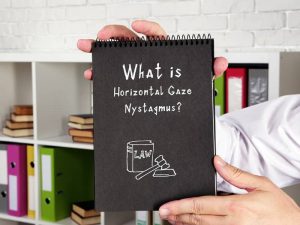If you are pulled over and asked to take a breath test, what should you do? Blow into the machine or refuse? 
In this blog post, we will discuss some of the consequences of both choices.
We will also talk about how to handle yourself if you are arrested for DWI and prepare a defense to the charges.
What is Driving While Impaired in North Carolina?
In North Carolina, it is illegal to operate a vehicle while being appreciably impaired by alcohol or drugs.
To get a conviction for DWI in NC, the prosecution must prove beyond reasonable doubt that you operated a motor vehicle while subject to an impairing substance.
That may be done in several different ways, including proof of things like:
- Driving a vehicle while under the influence of an impairing substance
- After consuming alcohol, a Breath Test (alcohol concentration) of .08 or higher
- Blood Test (alcohol concentration) with a reading of .08 or more
- Any amount of Schedule I controlled substance (N.C.G.S. 90-89) or metabolites in urine or blood
Can I refuse to blow?
Yes, you can refuse to blow into the breath test machine. However, if you do so, the police officer likely will report a Willful Refusal resulting in revocation of your driver’s license.
Even after a Willful Refusal, the charging officer (police officer, State Trooper, etc.) may apply for a Search Warrant to obtain a blood sample.
In certain, limited circumstances, a forced blood draw may be allowed if you refuse to provide a breath sample or blood alcohol test.
What are Standardized Field Sobriety Tests?
Standardized Field Sobriety Tests (SFSTs) are physical tests that have been developed to assist law enforcement officers in determining whether a person is impaired.
There are three standardized field sobriety tests: Horizontal Gaze Nystagmus, Walk and Turn, and One Leg Stand. 
The officer will likely ask you to perform a field sobriety test if they suspect that you are impaired.
Standardized Field Sobriety Tests may be used both to establish probable cause to arrest and to prove impairment.
Can I Refuse Field Sobriety Tests?
In North Carolina, you may refuse both the handheld breath testing device, known as the Alcosensor, and field sobriety tests.
Refusing the Alcosensor does not result in the suspension or revocation of your driver’s license. Refusing Field Sobriety tests also do not result in a penalty, criminal charge, or suspension of your license.
But, if you refuse to provide a roadside breath sample, the police officer may consider such refusal in making the arrest decision (probable cause to arrest).
If a law enforcement officer asks you to perform SFSTs, it’s generally considered best not to argue or question the request and politely decline field sobriety tests.
The police officer may be able to use your refusal later in court to argue that you were impaired.
Can I refuse to give a Blood Sample?
Like breath tests, a blood sample is subject to the NC Implied Consent Laws. 
If you willfully refuse a blow draw, the police officer ordinarily needs to obtain a search warrant from a judge or magistrate and the assistance of medical personnel in order to take your blood by force.
That process takes time and resources that law enforcement officers often do not want to spend on misdemeanor charges
There are instances when a forced blood draw may be authorized under the NC DWI laws.
What is a Forced Blood Draw or Blood Test?
Your right to Willfully Refuse to Blow, or to provide a breath or blood sample, is not absolute. The police officer may apply for a Search Warrant.
You may not refuse to submit to a Search Warrant authorizing a blood draw. 
If that happens, one type of forced blood draw occurs when a law enforcement officer obtains an order from a judge or magistrate to take your blood by force.
If you resist, the police may use reasonable physical force to obtain the sample. A medical professional may be present during this process. This type of test is often called a blood test because that is the type of sample taken.
Another type of forced blood draw happens when law enforcement officers NOT have a Search Warrant to take your blood and, therefore, they do not have an order from a judge or magistrate authorizing the use of physical force to obtain the sample.
Exigent circumstances may allow for a forced blow draw and the involuntary collection of a blood sample.
A forced blood draw, without an accompanying Search Warrant, is the exception to rule in North Carolina and therefore subject to substantial scrutiny by Courts.
Do I have a choice between a breath or blood sample?
Law enforcement has a choice between demanding a breath sample or a blood sample. You generally do not get to choose which type of test you want to provide.
The NC Implied Consent law authorizes the police officer to decide what type of testing. It is implied that you consent to a blood test, a breath sample, and/or a urine test.
In fact, the officer may request more than one test. If you do not wish to provide a sample and refuse to blow, we recommend you politely refuse and say nothing more.
To be clear, there are negative consequences if you refuse to blow than may in fact lead to a license suspension.
The NC motor vehicle laws are relatively complex. If you have questions about your field sobriety test, testing on the desktop breathalyzer machine or the handheld breathalyzer device, call Danny Glover Jr now.
What does Willful Refusal Mean?
Willful means intentional or purposeful. It doesn’t mean that you have to be argumentative or belligerent in refusing a breath test.
It is not willful refusal if the person cannot give a sample because they are unconscious or otherwise incapable of submitting to testing due to physical incapacity.
Were you stopped at a DWI Checkpoint?
Therefore, even if you don’t want to take a breath test, it’s usually best not to argue with the officer and politely refuse to blow.
Refusing the test, without providing an explanation or excuse, is often enough to show that you intended to refuse.
You have the right to remain silent under the Fifth Amendment.
You are not required to explain yourself or your reasons to provide a blood sample or refuse to blow.
What is a Breathalyzer?
A breathalyzer is an old device used to obtain breath sample for alcohol. The breathalyzer is no longer used in North Carolina.
Despite that, people regularly refer to the roadside breath test and approved evidentiary breath testing on the approved device (the Intoximeter EC/IR II) as a breathalyzer test.
The breathalyzer test measured a person’s blood alcohol concentration (BAC) by analyzing a breath sample.
Can I get a Hardship License – Driving Privilege?
Alcosensor FST (the handheld, roadside breath test) numerical results are not admissible as evidence in North Carolina. If you refuse to blow into the Alcosensor it does not result in license suspension.
In determining exigency to conduct a forced blood draw, a positive result on the Alcosensor may be presented in a hearing on a Motion to Suppress.
If you have questions about a license suspension, sobriety test, reasonable suspicion to stop, the implied consent laws in NC, and your “DUI charge,” call defense attorney Dany Glover Jr. to schedule a consultation at our law office.
What happens if you refuse to blow in North Carolina?
If you are pulled over and suspected of driving while impaired (DWI), the officer will likely ask you to take a breath test.
You may be wondering if you should blow into the machine or refuse. Here is some information about what happens if you choose each option:
If you choose to blow into the machine, it will test your blood alcohol concentration (BAC). If you are over the legal limit, you may be arrested and charged with DWI.
If you choose to refuse to blow into the handheld breathalyzer device (the Alcosensor), you will likely be arrested and charged with Driving While Impaired.
** In North Carolina, the police officer is NOT required to arrest you or take you to the police station. They may simply issue a Uniform Citation to charge you with Driving While Impaired – DWI.
Similarly, an officer is not required to perform a physical test, field sobriety test, or handheld breathalyzer device to establish probable cause to arrest.
What Happens with a DWI arrest?
If you refuse to blow on the desktop breathalyzer machine or submit to a blood test, that ordinarily results in notice of a “Willful Refusal” being sent to NCDMV.
If the charging officer demanded a sample without legal authority, probable cause or “reasonable grounds,” there may be a legal basis to challenge the resulting license suspension.
Reasonable grounds is different from reasonable suspicion.
Each case and each factual scenario are different. License suspension issues tend to be pretty complicated.
We recommend you consult with a DWI attorney at a law firm with substantial experience handling DWI charges on the Outer Banks.
What is the Legal Limit in North Carolina?
In North Carolina, the legal limit for BAC is 0.08%. If you are pulled over and have a BAC of 0.08% or more, you may be arrested and charged with DWI.
If you refuse to blow, there may be other ways to prove appreciable impairment. That may include:
- Your performance on a sobriety test or field sobriety test (FST) such as the eye test (the HGN), the one leg stand, and the “walk and turn”
- The way you drove the motor vehicle
- What you told LEO at the police station including admissions about drinking prior to your arrest or being charged with DWI
What’s the difference between DUI and DWI in NC?
As a practical matter, it does not matter whether you prefer to call the offense DWI or DUI. Criminal defense lawyers understand what you are talking about.
DUI traditionally refers to Driving Under the Influence of alcohol or drugs. DWI is the acronym for Driving While While subject to an impairing substance.
Some states use other terms such as OUI or OWI. DWI may also refer to driving while intoxicated, rather than driving while impaired.
The NC DWI law is titled Impaired Driving and does not reference either acronym DWI or DUI.
The key thing is that you should have an experienced criminal defense lawyer who handles DWI cases.
If you are looking for a criminal defense lawyer in the Outer Banks, please call our law firm at (252)-299-5300 to schedule a consultation. We would be happy to discuss your case with you.
What are the Penalties for Driving While Impaired in NC?
The penalties for driving while impaired (DWI) in North Carolina depend on your BAC level and whether you have any previous DWI convictions.
The prosecutor carries the Burden of Proof to prove the existence of Grossly Aggravating Factors and Aggravating Factors. The standard of proof is Beyond a Reasonable Doubt.
The Defendant carries the Burden of Proof to prove Mitigating Factors. That standard of proof is by a Preponderance of the Evidence.
There is no distinction between a DUI conviction and punishment for violating the NC DWI laws.
Any license suspension will be the same. The legal standards for reasonable suspicion, probable cause, and operation of a motor vehicle are the same.
Can I appeal a license revocation for refusing to blow?
Yes. You have the right to appeal a license revocation / license suspension for refusing to blow into a breathalyzer machine. The process is complicated, and it is best to speak with an experienced criminal defense lawyer about your options.
If you are arrested for DWI in North Carolina, contact the Danny Glover Jr. law firm to schedule a free consultation.
Can I get a hardship license or limited privilege?
If you are convicted of DWI and your license is revoked by the sentencing judge, you may be eligible for a limited driving privilege or hardship license.
There is also something called a Pretrial Limited Driving Privilege related to any immediate Civil Revocation.
If eligible, you will need to obtain an alcohol assessment and provide proof of financial responsibility. SAMPLE Pretrial Limited Driving Privilege – Implied Consent Offense
The process is complicated, and we think it best to speak with an experienced criminal defense lawyer about refusing to blow, license suspension, blood alcohol content, and the implied consent laws.
If a Willful Refusal is sustained due to failing to submit to a breathalyzer test (refusing to blow into the EC/IR II) at the police station or blood sample (or urine sample), the licensure process is substantially more problematic.
There is a type of limited driving privilege in NC related to refusing a blood alcohol test or breathalyzer test. It’s called a Willful Refusal Limited Drving Privilege.
There are conditions relating to your ability to drive after refusing to take blood test or breathalyzer test, they include things like:
- At the time you refused a blood draw or breathalyzer test, your driver’s license was valid or had not been expired for a year or more
- At the time of the Willful Refusal, within 7 years, you did not have a prior conviction for an impaired driving offense
- At the time of the Refusal, you did not, within 7 years, Willfully Refuse a breathalyzer test or blood test (N.C.G.S. 20-16.2
- The present DWI charges cannot involve the critical injury to another person or the death of another person
- The present DWI charge relating to a request to submit to a chemical analysis (blood sample, breathalyzer test, urine test, etc.) is finally disposed (by dismissal or being found not guilty) or, if convicted of DWI, the level of punishment authorizes a Limited Driving Privilege (N.C.G.S. 20-179.3) and you have complied with one or more conditions of probation that are mandatory
- After the refusal to take a breathalyzer test or provide a blood sample, you have no other unresolved pending charges (or convictions of) DWI
It’s extremely important to note, one of the most important aspects of a Willful Refusal Limited Privilege is that in addition to the conditions listed above (and as are more fully set forth under the NC DWI laws), you cannot apply for a Limited Privilege for 6 months.
That means, after a Willful Refusal for a DUI arrest, your license must be revoked for at least six months for the refusing a breathalyzer test or blood draw.
A substance abuse assessment is required. All recommended treatment programs and training must also be completed when you apply for a Willful Refusal Limited Privilege. Proof of compliance (certificate) with assessment and treatment must be filed with the Clerk of Court.
If you are arrested for DWI in North Carolina and refuse to blow or submit to a blood draw, contact us for a free consultation. We will help you understand the issues in your case and explain how we can help.
License suspension issues are notoriously complicated, and each case is different and unique. We recommend you establish an attorney client relationship to answer any questions you may have.
If I refuse to blow, does that mean I cannot be convicted of DWI?
No. The implied consent law says a driver who refuses to take a chemical test will have his license revoked for a year (or more), but he may still be convicted
Refusing to blow into a breathalyzer, take a field sobriety test, or submitting to a blood test after being arrested for DWI can have serious consequences, including the revocation of your driver’s license.
It is important to understand that these are not the only consequences of refusing to take a chemical test or blowing over the legal limit. You should speak with an experienced criminal defense lawyer about your DUI charge.
Refusing the Breathalyzer Test Doesn’t Guarantee You Will Not be Convicted of DWI
In North Carolina, if you are pulled over and suspected of driving while impaired (DWI), you may be asked to take a breathalyzer test or submit to a blood draw.
If you refuse to take the test, your driver’s license will likely be suspended for a year and possibly more given the factual background, but you can still be convicted of DWI.
 North Carolina Criminal Law Updates
North Carolina Criminal Law Updates





